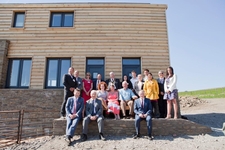Last week, Milica Kitson, Emma Thomas and Ed Evans, CEWales, joined the Welsh Government Minister for Natural Resources and Food, Alun Davies AM, members and officers of Caerphilly County Borough Council (CCBC), representatives from Scottish and Southern Energy (SSE) and Building Research Establishment (BRE) at Maes Yr Onn Farm, Manmoel, high above the Gwent valleys, to witness the opening of Wales’ first fully ‘off-grid’ and truly self sufficient farms!

The Manmoel area comprises of a small village with surrounding hill farms in the county borough of Caerphilly in South East Wales. The area around the village forms a remote rural community that was originally based on agriculture. The farm established in 1825 comprises 84 Ha and has been farmed on a commercial basis by Arthur Davies and his family for over 30 years. Unfortunately, the original farmhouse fell into disrepair many years ago and Arthur and his family lived off-site. Their efforts to re-establish a presence on the farm was further hampered by a lack of electricity, gas, water or sewerage services at this upland site.
However, with the support of a number of organisations, Arthur and his wife, Sue gained outline planning permission to construct a farmhouse on the former site in May 2011. The construction of the new farmhouse will ensure effective day-to-day management of the farm and stock and will enable further expansion of the business.
 The project involved an effective working partnership between the key stakeholders including the Davies family, CCBC RDP Energy team, BRE and SSE. All partners have had an integral role to play in making the project happen and to turn Arthur and Sue’s dream into reality. The Council managed the project from its initiation. BRE provided the building design work and initial technical feasibility of the renewable energy technologies and SSE provided the funding, design and installation services of these technologies.
The project involved an effective working partnership between the key stakeholders including the Davies family, CCBC RDP Energy team, BRE and SSE. All partners have had an integral role to play in making the project happen and to turn Arthur and Sue’s dream into reality. The Council managed the project from its initiation. BRE provided the building design work and initial technical feasibility of the renewable energy technologies and SSE provided the funding, design and installation services of these technologies.
Apart from building a new residence for the family the main aim of the project was to provide a renewable energy generation and water resource solution in an off-grid setting. This involved some major challenges including balancing the various technologies and also ensuring compliance with all appropriate regulations including Planning, Building Regulations and the Code for Sustainable Homes.
So what about the role of CEWales? We came into this project at a relatively late stage but, through the work of the Wales Low Zero Carbon Hub (WLZCH), we will be monitoring demand, consumption and human behaviour at the farm over the next two years. We will analyse the data and report periodically on the lessons learnt from the project so that others can benefit from these experiences as they pursue their own ‘off-grid’ or partial ‘off-grid’ aspiration.

This project will help to strengthen the family’s presence at the site. CEWales are extremely excited to be part of this project and look forward to working with the family as they pursue their ‘low carbon lifestyle’ and share their experiences across Wales.
Further information on the project will be posted on our website as the monitoring phase progresses. We also expect to hold a number of events over the next two years to share the lessons learnt and these will be advertised on our website.
Caerphilly Council (who are signatories of the Welsh Government Sustainable Development Charter) have photo documented the development – these can be viewed on flickr. The Cynnal Cymru facebook page also features more photographs from the visit.